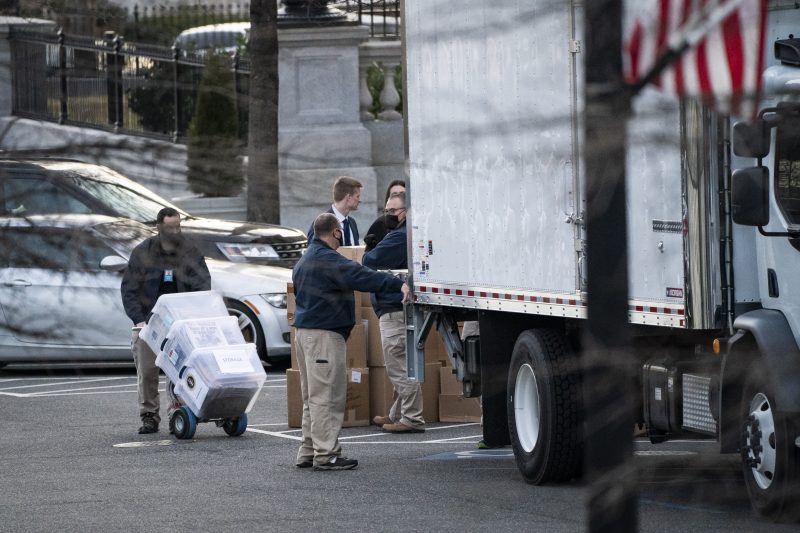In the final hours of a president’s term, amid the hubbub of transition talks, 11th-hour pardons and last-minute executive orders, officials from the National Archives and Records Administration quietly descend on the White House in an attempt to ensure compliance with the Presidential Records Act.
The process, which has been honed over decades and involves intricate planning and coordination, generally takes place swiftly and smoothly, according to several officials who have participated in it.
But recent revelations that both former president Donald Trump and President Biden kept government documents at their private homes after leaving office highlight the fragility of records management practices that are based largely on the “honor system,” officials say.
Trump defiantly took classified documents and has resisted returning them, while Biden’s team says it has returned papers from his vice presidency that aides accidentally misplaced. But both cases reflect an underlying fact about how presidents handle the nation’s secrets, experts say: The rules are clear, but enforcing them is hard.
“Materials generated from the work of the president belong to the American people — that’s pretty straightforward. The complicated part is enforcement,” said Jim Grossman, executive director of the American Historical Association. “The Presidential Records Act lacks teeth. It lacks enforcement mechanisms.”
The Presidential Records Act, passed in 1978 after President Richard M. Nixon had sought to destroy White House tapes during the Watergate scandal, specified that presidential records belong to the public and are to be turned over to NARA — the Archives — at the end of a presidency. The act also covers vice-presidential records and applies to classified documents, which are also governed by other laws.
But the statute can be difficult to carry out in practice, because government archivists have little ability to order presidents (or vice presidents) to comply.
At noon on Jan. 20, as a new president is sworn in, NARA instantly becomes the lawful owner of millions of presidential papers from the outgoing chief executive. Arranging that transfer requires months of coordination and planning, culminating in a massive move of documents from the White House.
“There is an artful ballet on Inauguration Day, where our people would come rolling in there in the morning,” said a former NARA official, speaking on the condition of anonymity to discuss internal processes.
But because Archives staffers do not claim ownership until that moment, they have limited authority to determine what happens in the days and weeks leading up to a presidential transition — how documents are evaluated, sorted, packed up and stored.
NARA employees, sometimes working with the help of members of the military, try to use the final hours of a presidency to finish labeling, sorting and boxing thousands of official and classified records at the White House and loading them onto trucks to be carted to Andrews Air Force Base. There, government planes are on standby to fly the records to a storage facility near the site of the outgoing president’s future library, which is administered by NARA.
But while they are in office, presidents maintain legal jurisdiction over all White House records, giving them broad leeway over how to manage and handle them. The law encourages the White House to coordinate and consult with NARA, but the fact that the national archivist reports to the president makes enforcement difficult, said Grossman, whose organization advocates for strict compliance with government records laws.
The unprecedented ascent of a political newcomer to the presidency in 2017 exposed the limits of a system reliant on voluntary cooperation. Trump, who regularly flouted norms and fired government officials with whom he clashed, showed little regard for the strictures of presidential record-keeping, complicating NARA’s efforts, officials said.
“The honor system is absolutely there. The Archives does not have anybody posted in the Oval Office or following the president into the bathroom, obviously,” said the former NARA official, referring to reports that Trump flushed documents down the toilet while in office. “And if you can’t do that, then the president dropping a couple of papers into a briefcase and going upstairs — you’re not going to be able to control that either.”
Trump has denied discarding presidential papers in the toilet.
Complicating matters in Biden’s case, vice-presidential records do not always receive the same level of scrutiny as those of a president. In the case of the commander in chief, the Archives traditionally begins preparing to take control of records months or even years before the end of the administration, part of the preparation for a post-presidential library.
Classified documents, of course, are supposed to receive a high level of scrutiny regardless of who is using them, and they typically are not mixed with nonclassified records. They receive special markings and are placed in folders and boxes with prominent labels to prevent their mishandling.
Nonetheless, such records ended up at Trump’s Mar-a-Lago estate in Florida, Biden’s office at the Penn Biden Center for Diplomacy and Global Engagement in Washington and the garage of at Biden’s private home in Wilmington, Del.
The White House Counsel’s Office and the vice president’s office typically designate particular staffers to serve as a point of contact with NARA on presidential records. Officials at the National Security Council are authorized to review classified materials and determine how they are to be preserved.
Biden has insisted that the misplacement of papers from his time as vice president was a mistake he knew little about. “I was briefed about this discovery and surprised to learn that there were any government records that were taken there to that office,” Biden told reporters Jan. 10, referring to the office at the Penn Biden Center.
Trump has taken a different approach — at times accusing investigators of planting the materials, or claiming that he mentally declassified them. He also has argued that the discovery of presidential records at his private resort does not suggest a major transgression, accusing his predecessors of also being lax about compliance with the Presidential Records Act.
While most of Trump’s allegations about previous presidents taking documents from the White House have been false or exaggerated, Biden’s predicament has provided him with political cover and raised fresh questions about how the laws governing presidential records are enforced.
Biden’s lawyers have yet to provide a full accounting of how classified records from his vice-presidential term bypassed protocols and ended up at unauthorized locations — including in a garage near his 1967 Corvette. Biden’s lawyers have described the situation as a “mistake” but have provided few details about how and why the documents were discovered almost six years after Biden’s vice presidency ended.
The number of government records used by presidents and vice presidents has grown significantly over time, with the advent of electronic communication and other technologies. While most electronic records do not need to be printed to be archived, they have to be reformatted, sorted and preserved among troves of government data — a process that can take months to complete.
While the Reagan administration turned over about 43 million pages of records to the Archives — including 8 million pages of classified records — former president Bill Clinton’s team turned over about 75 million pages, according to NARA. Transporting Clinton’s records from Washington required eight flights of large C-5 military transport aircraft, Nancy Kegan Smith, a former archivist at NARA, wrote in a 2008 article for NARA’s Prologue magazine. In more recent presidencies, the record hauls have been measured both in pages and terabytes.
With so many records, disputes often arise over whether a document is a personal item belonging to the president or an official record that belongs to the public. The Presidential Records Act comes down largely on the public’s side, deeming most materials related to presidential activity — including letters, gifts and recordings — to be official in nature. And all classified documents are considered government property.
Beyond the principle that a democratic government’s products belong to the people, historians say scholars, activists and lawmakers must be able to shed light on previous presidencies so lessons can be learned.
Presidential records show everything from “the most personal and private thoughts and feelings of a President to the most formal foreign policy memorandums on presidential decision-making,” Smith wrote as she prepared for the transition at the end of President George W. Bush’s second term.
When official records are taken to a private residence, the calculus can become even more complex. Presidents sometimes take such materials when they travel during their tenure, including weekend trips to their homes, or simply when they leave the Oval Office and go upstairs to the White House residence, an area NARA officials do not typically visit.
While aides are supposed to ensure that those records ultimately return to the government, compliance can be spotty.
“It’s not uncommon for mistakes to be made,” said Grossman, referring to the discovery of classified material by Biden’s lawyers. “This happens by mistake all the time. The issue is really what happens when someone realizes a mistake was made.”
Aides to Biden have tried to highlight the difference between his case that of Trump, who has antagonized the Archives and rebuffed many of its requests. Biden’s aides say they sought to ensure that the documents discovered by his lawyers in his post-vice presidential office and at his Wilmington home were immediately handed over to NARA.
Biden’s lawyers also say the number of secret documents discovered in unauthorized locations remains small — a double-digit number — compared with hundreds of records Trump took to Mar-a-Lago, where FBI agents seized several boxes of classified information last year.
But Rep. James Comer (R-Ky.), who chairs the House Oversight Committee, said Biden’s mishandling of documents is nonetheless a matter of serious concern.
“It is troubling that classified documents have been improperly stored at the home of President Biden for at least six years, raising questions about who may have reviewed or had access to classified information,” said Comer, whose committee plans to scrutinize the matter.
And when asked whether they can provide assurances that no additional classified papers remain in private locations connected with Biden, White House aides have repeatedly demurred.








